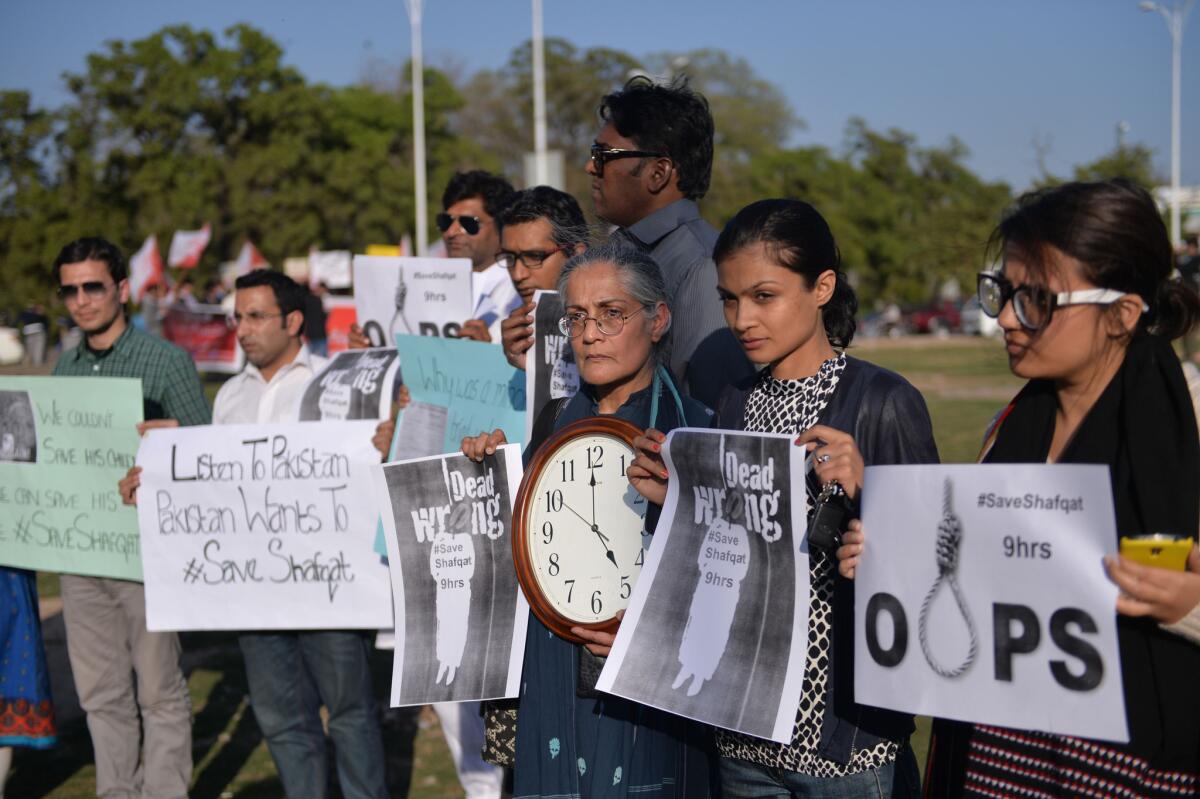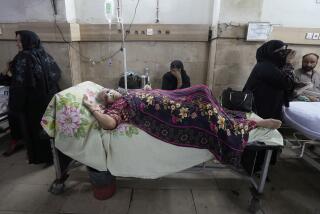Pakistan halts execution of man convicted as 14-year-old

Pakistani officials said Thursday that they had issued a temporary reprieve to a man who was due to be executed for a crime allegedly committed when he was 14, in a case that has drawn worldwide attention.
Hours before Shafqat Hussain was to be hanged early Thursday morning, Interior Minister Chaudhry Nisar Ali Khan asked the president of Pakistan for a delay pending a re-examination of the case, including his age and reports that he was severely tortured before he confessed.
There were conflicting reports about the length of the delay. A spokesman for the government in Sindh province, where Hussain is imprisoned, tweeted that the execution was stayed for three days; family members told The Times the delay was indefinite.
The decision followed a passionate advocacy campaign by Hussain’s family, lawyers and domestic and international human rights groups, which have criticized Pakistan for lifting a moratorium on capital punishment three months ago. The government has since executed nearly 40 prisoners, including 12 in one day earlier this week.
“I am thankful to lawyers, media, human rights organizations, civil society and the international community for this,” Hussain’s brother Gul Zaman said in an interview. “I am so happy that the government has decided to halt his execution. We hope to get justice.”
His mother, Makhani Begum, 86, said she was unable to sleep after receiving word of the reprieve shortly before midnight Thursday.
“I offered prayers and thanked God all night,” she said.
Lawyers for Hussain, who was convicted at age 14 of killing a child in 2004, say his confession was extracted by torture. Police in the port city of Karachi allegedly placed him in solitary confinement, burned him with cigarette butts, removed his fingernails and administered electric shocks to his genitals, according to advocacy groups that have studied his case.
His family hails from the Pakistani portion of Kashmir – the disputed mountain territory that lies along the Indian border – and was too poor to afford a good lawyer in the early stages of his case, family members said. His mother has not been able to visit him since 2006 due to financial constraints.
On Wednesday night, Hussain handed a will to his brother Gul Zaman at Central Jail in Karachi.
“He told me that he was innocent,” Zaman said. “He said that his murder would be on the people in power who would be answerable for this on judgment day,”
Days earlier, Khan, the interior minister, said in parliament that Hussain’s case should not be politicized, adding that his appeals had been exhausted.
Human rights groups have called the prosecution of Hussain extremely flawed, including the decision to try him before the controversial Anti-Terrorism Court when his case was not a national security matter. They have also criticized Pakistan for imposing the death penalty against people who were younger than 18 at the time of the crime, in violation of international laws.
After not carrying out executions for several years, Pakistan lifted a ban on capital punishment in December as part of tough new policies against terrorism following the Pakistani Taliban’s massacre of 132 children at an army-run school.
Of the estimated 8,000 inmates on Pakistan’s death row, about 800 are believed to be juveniles, according to a recent report by the British-based charity Reprieve and the nonprofit advocacy group Justice Project Pakistan.
“Minister Nisar must at last conduct the full and proper inquiry into Shafqat’s case that was initially promised, and stay all other impending executions while he works out how many of those people may have been tortured into ‘confessing’ to crimes when they were children,” Reprieve said in a statement.
Although relieved, Hussain’s family was badly shaken by the news of his impending execution. His 84-year-old father Shazullah went missing Wednesday morning and had not been located as of Thursday afternoon, Hussain’s brother Manzoor said.
Hussain’s mother said she could not travel to Karachi but was hoping for his conviction to be overturned.
“I do not have money to travel to Karachi,” she said. “Please, pray that my son will come to me as soon as possible. I cannot wait. I want to talk to him.”
Sahi is a special correspondent. Staff writer Bengali reported from Kolkata, India.
For more news from South Asia, follow @SBengali on Twitter
More to Read
Sign up for Essential California
The most important California stories and recommendations in your inbox every morning.
You may occasionally receive promotional content from the Los Angeles Times.











